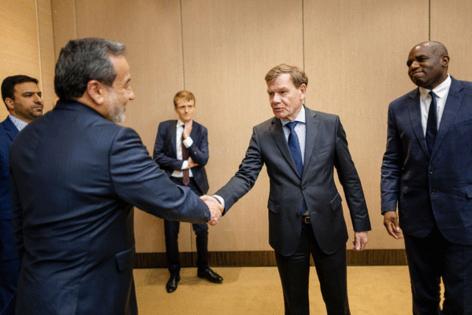Deal, not bombs, seen as only way to end Iranian nuclear threat
Published in News & Features
WASHINGTON — While President Donald Trump weighs whether to join Israel’s assault on Iran, foreign policy veterans and analysts argue that a negotiated settlement, not bombs nor commandos, is the only way to eliminate the threat of Tehran gaining a nuclear weapon.
“I don’t believe there’s a lasting military solution to the Iranian nuclear problem,” said Caroline Zier, a former senior Pentagon official under Republican and Democratic administrations. “You can delay, you can set back, but the long-term solution comes at the negotiating table.”
For Trump, a deal would avoid dragging the U.S. into another regional war or driving up inflation-generating oil prices. Israel is determined to eliminate what it sees as an existential threat. And Iran is desperate to remove crippling economic sanctions.
Yet such an outcome right now faces a dilemma, as Iran says it won’t negotiate if Israel continues its attacks while the U.S. and its allies hold that a ceasefire is only possible if the Iranians make substantial concessions in talks that had been underway until the Israeli air campaign began. Iran, which denies it wants a nuclear arsenal, has also said it won’t give up the right to enrich uranium or eliminate its missile programs.
The U.K. has tried to persuade the Trump administration not to give up on negotiations after five rounds of talks between Washington and Tehran. Foreign Secretary David Lammy held talks with U.S. Secretary of State Marco Rubio and special envoy Steve Witkoff on Thursday before flying to Geneva to speak with Iran’s foreign minister alongside French and German counterparts on Friday.
The officials emerged from the meeting sounding hopeful but major gaps remain.
Israel’s demands go beyond the nuclear program, to include stopping ballistic missile development and no longer funding of regional militias, according to a person familiar with the government’s intentions who asked not to be identified discussing private deliberations. That position, however, is a non-starter for Iran.
“If the aggression ceases and the aggressor is held accountable for its crimes, Iran is ready to reconsider the path of diplomacy,” Iranian Foreign Minister Abbas Araghchi said after the meeting in Geneva, according to state-run IRNA. “Iran’s capabilities — including its missile program — are not up for negotiation.”
Trump still appears undecided about what to do but remains open to getting involved militarily. On Friday, he dismissed the European efforts to find a solution but ruled out the involvement of American ground troops.
“I’m giving them a period of time,” he told reporters in New Jersey, after meeting earlier Friday with his national security team. “I would say two weeks would be the maximum.”
A blueprint for a deal exists — the 2015 Joint Comprehensive Plan of Action that was signed by President Barack Obama and which Trump abandoned 2018. Under that accord, Iran agreed to curbs on its nuclear program in return for sanctions relief.
Daniel Kurtzer, a former U.S. ambassador to Israel and Egypt, suggested making any new deal open-ended rather than setting an expiration date on some limits as the JCPOA did.
“A tougher agreement could lead to Iranian compliance and an end to the war, therefore an end to the Iranian nuclear program,” said Kurtzer, who is now a professor at Princeton University.
Iran adhered to the JCPOA for three years, Kurtzer said. The question now is whether the Israeli military campaign would persuade Iran to abandon uranium enrichment or make its leaders more determined to retain that ability.
“We don’t know whether the debilitation of their military capabilities — their missile programs and nuclear programs — will now make a convincing argument otherwise,” Kurtzer said.
Yet the Iranians might be wary of entering into a new nuclear agreement with Trump after he backed out of the last one.
While the focus has been on the use of America’s so-called bunker buster bombs against the Fordow enrichment facility, the overall program, not to mention the sense of national identity wrapped up in its development, would be harder to eliminate.
Iran has developed a heavily fortified network of sites nationwide to pursue its ambitions of uranium enrichment, as well as thousands of scientists and engineers working at dozens of locations.
“Striking Fordow successfully would be devastating but it wouldn’t end the program,” Barbara Leaf, former U.S. assistant secretary of state for Near Eastern Affairs, said in a Bloomberg Television interview.
“I want to hear a pretty clear full-throated ‘yes, we’re ready to negotiate,’ from the regime, and we’re not hearing that yet,” Leaf said. “There’s conditionality.”
A key element for any deal would be a trusted interlocutor, which seems no party is currently able to play.
Iran recently criticized the International Atomic Energy Agency, the United Nations-backed watchdog, for giving Israel an excuse to strike after it reported late last month that Iran expanded its stockpiles of near weapons-grade uranium. The agency denies the charge.
“A diplomatic solution is within reach if the necessary political will is there,” IAEA Director-General Rafael Mariano Grossi told the U.N. Security Council. “This opportunity should not be missed.”
©2025 Bloomberg L.P. Visit bloomberg.com. Distributed by Tribune Content Agency, LLC.







Comments